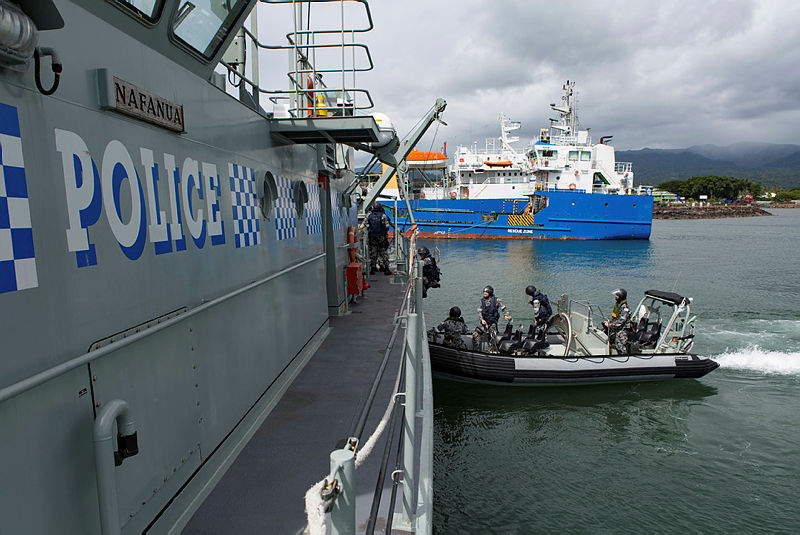
The beat
Samoa left without a police patrol boat
As Australia prepares to deliver police patrol boat Nafanua II to Samoa in September, the vessel it replaces, SPB Nafanua, is being sailed back to Australia. A Samoan news outlet reported that the absence of a patrol boat is causing some concern as the nation will have to rely on private companies and neighbours to help patrol its exclusive economic zone until the new vessel arrives.
UK bans police equipment exports to Hong Kong
UK Foreign Secretary and contender for the prime ministership Jeremy Hunt has announced that no new export licences for tear gas and other crowd-control equipment will be approved for Hong Kong. In recent weeks, allegations of police brutality have surfaced after mass protests against extradition laws proposed by the Hong Kong government.
New Zealand to start gun buybacks
In the wake of the terrorist attack in Christchurch, the New Zealand government moved to reform the country’s gun laws. This week, police have announced that a gun buyback scheme will begin next month, with nearly 200 buyback events scheduled over the next three months.
Checkpoint
PNG fisherman lands a different kind of haul
Far off the eastern coast of Papua New Guinea, a fisherman found a cache of cocaine worth $50 million buried in the sand on a remote atoll. After six narco-traffickers caught up with him, they took off with the haul and were pursued by the PNG navy for a week before being arrested and imprisoned. This incident highlights a broader trend in which drug smugglers are island-hopping across the Pacific to get from South America to the lucrative Australian market.
Indonesia moves to restrict foreign researchers
Indonesia is considering tightening visa controls on people undertaking academic research there. A proposed new law would require foreign academics to have a local individual or organisation assume responsibility for them, which may act as a significant impediment for researchers. Indonesia has also cracked down on the use of tourist visas for academic research purposes, with two high-profile Australia-based Indonesia experts denied entry in recent months.
New rail connection opens between Thailand and Cambodia
Train services between Thailand and Cambodia will resume on 1 July, 45 years after the last rail journey between the two countries. The train service between Aranayaprathet and Poipet stopped in 1974 due to Cambodia’s civil war. Thai Prime Minister Prayut Chan-o-cha and Cambodian Prime Minister Hun Sen agreed to lift the suspension in 2015, but upgrades and the construction of a new bridge delayed the start of services for several years.
CT scan
WA to allow terror suspects to be held for 14 days
New counterterrorism laws have been proposed in Western Australia that would allow police to detain individuals they reasonably suspect of planning an imminent terrorist attack within the next 14 days for up to a fortnight without charge. These amendments seek to bring WA laws into line with those of other states and territories, under an agreement reached at a meeting of the Council of Australian Governments in October 2017.
Iran’s scramble to set up African terror cells
Iran has reportedly set up terror cells across the Sahel region and central Africa, according to the Telegraph. This new network of terror cells is alleged to have been created to target US and other Western military bases and embassies in retaliation for increased sanctions. The newspaper says approximately 300 militants have been recruited and trained by Iran’s Islamic Revolutionary Guard Corps.
Islamic State leader captured in Yemen
The leader of the Islamic State terror group in Yemen, Abu Osama al-Muhajer, has been captured by Saudi and Yemeni military forces. A house in southern Yemen was under surveillance before the raid, in which a number of other individuals were captured and weapons and equipment were seized. A video of the men being led off an aircraft has been released by Saudi media.
First responder
Chennai faces water crisis
The eastern Indian city of Chennai, with a population of roughly 10 million people, is almost out of water. Satellite imagery shows that one of the city’s main water reservoirs has dried up. Delayed monsoon rains and poor wastewater management are to blame for what is quickly becoming a major crisis. Schools and businesses have closed, and protests have broken out over the lack of water.
Thailand organises tsunami drills
Thailand’s interior ministry and its disaster prevention and mitigation department have held tsunami evacuation and rescue exercises in six provinces on the country’s southwestern coastline. Further exercises and meetings will be held in the coming weeks. Last year, a review of tsunami evacuation routes was ordered after it was found that a warning buoy near Phuket had not been working and warning towers were faulty.
Facebook creates new maps to help first responders
Facebook has unveiled a population map of the Asia–Pacific that it says is up to three times more detailed than other sources. Facebook’s artificial intelligence team used publicly available data to create the map. It’s designed to help government authorities and first responders better manage natural disasters and pandemics by providing an accurate picture of the number of people in a given area. The map will be available to the public on the United Nations Office for the Coordination of Humanitarian Affairs data-sharing platform.

